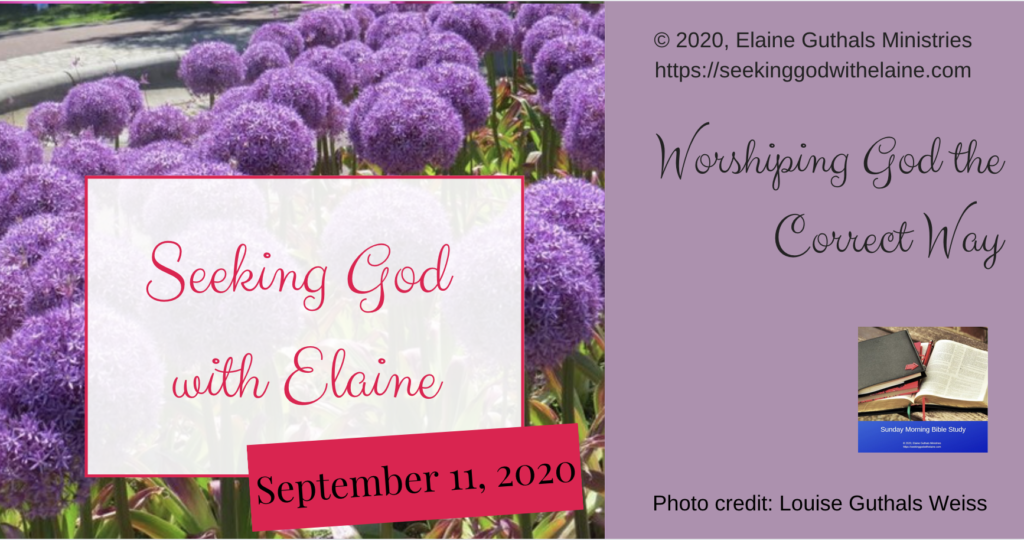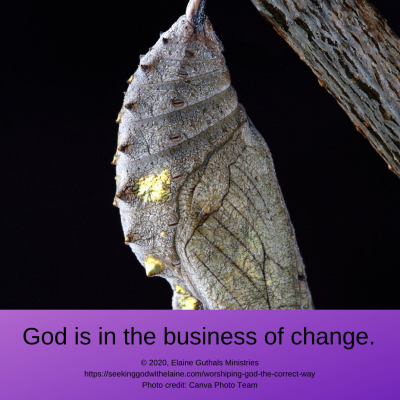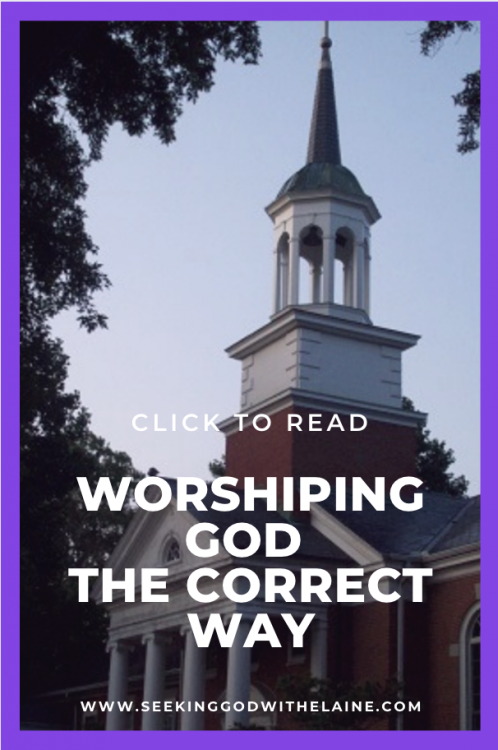When Isaiah prophesied to the Israelites, they were worshiping God. But God was not accepting their worship because they weren’t worshiping in the right way. This daily devotional looks at why God rejected their worship and what their punishment from God was.
Nuggets
- Even though the Israelites were God’s chosen people, they did not have perfect characters.
- Still, the Israelites held tightly to the ceremony of the temple.
- The Israelites didn’t change and had brought God’s judgment upon themselves.
- Sacrifices have to be offered to God in the right way for the right reasons.
Isaiah’s Message from Sovereign God Series

Yeah! My Ladies and I are getting to meet again. We combined with my Springfield Mom’s class and are meeting in a larger room so we can spread apart.
This quarter for Sunday Morning Bible Study, we are looking at Isaiah. It is the most quoted book in the New Testament (Lifeway).
Resource
Lifeway’s Explore the Bible Series Fall 2020
I can’t wait to see where this quarter takes us. Let’s set it up with Chapter 1.
The Writer
“The vision concerning Judah and Jerusalem that Isaiah son of Amoz saw during the reigns of Kings Uzziah, Jotham, Ahaz, and Hezekiah of Judah” (Isa. 1: 1 CSB)
Are you like me? You think the disciples and the prophets were common, uneducated men? We know the Scriptures tell us that about the disciples.
Isaiah purportedly had ties to the royal family, it is believed that his father Amoz was the brother of King Amaziah (Geikie).
Resource
The Book of Isaiah covers a really large time span. Some want to discount Isaiah as being the sole writer of the book because he describes things that happen after his death.
Duh. That is what being a prophet is all about! Prophets were called “seers” since their perceptions were called “seeing.” The entire message was called a “vision” (Skinner). Isaiah was seeing the future because God gave him that ability.
Resource
There was a reason for listing all of the kings. Isaiah wanted to identify the time period in which he prophesied in order to help us identify the circumstances being addressed (Horton).
Resource
God’s People Are Punished for Sins
“Listen, heavens, and pay attention, earth, for the Lord has spoken: ‘I have raised children and brought them up, but they have rebelled against me. The ox knows its owner, and the donkey its master’s feeding trough, but Israel does not know; my people do not understand’” (Isa. 1: 2-3 CSB)
Even though the Israelites were God’s chosen people, they did not have perfect characters. The Israelites may have been going through the ritual motions, but they were not worshiping from the heart level.
Still, a remnant of believers remained faithful. God had long kept a group of righteous people, faithful to Himself, after a judgment. “… Therefore pray for the remnant that still survives” (Isa. 37: 4 NIV).
The main point is they were God’s people, but that didn’t save them from messing up. There was a great nugget in The Sinful Nation in the Sermons by the Monday Clubs. It said, “Our privileges cannot save us, and even our blessings may become a curse. God cannot give to us personally what we will not receive.”
Glossary
Resource
We may have ABCDed and are no longer spiritually dead. That does not give license to keep on sinning. Sin is actions by humans that disobey God and break one of His reasonable, holy, and righteous laws and commandments, goes against a purpose He has for us, or follows Satan’s promptings.
The ABCDs of Salvation
If you have not become a believer in Christ, please read through the
Plan of Salvation and prayerfully consider what God is asking you to do.
A – admit our sins
B – believe His Son Jesus is our Redeemer
C – confess God as Sovereign Lord
D – demonstrate that commitment by making any changes needed in our lives to
live the way in which God has called us
The Disciple’s Job Description
When God calls us to salvation, He calls us to change. Salvation is deliverance from evil and the consequences of sins to replace them with eternal life and good.
It is that replace part that on which He is focusing. We are still punished for our sins.
What Were Israel’s Sins in Isaiah’s Day?
“Oh sinful nation, people weighed down with iniquity, brood of evildoers, depraved children! They have abandoned the Lord; they have despised the Holy One of Israel; they have turned their backs on him. Why do you want more beatings? Why do you keep on rebelling? The whole head is hurt, and the whole heart is sick. From the sole of the foot even to the head, no spot is uninjured — wounds, welts, and festering sores not cleansed, bandaged, or soothed with oil” (Isa. 1: 4-6 CSB)
No, the Israelites in Isaiah’s day weren’t perfect. They hadn’t stopped sinning.
Gold and silver idols were worshiped along with the sun and moon. Altars had been built on the streets. Children were sacrificed to Moloch.
That was some pretty big sins.
Still, the Israelites held tightly to the ceremony of the temple. It was like they wanted their cake and eat it, too.
The Israelites believed in God. They thought that was enough.
They were going through the motions. They thought that was enough.
Okay. I am going to have to process this. “There was neither perfection nor spirituality in such a ritual; yet in such a system God tried to elevate the nation to spiritual truths they could not yet apprehend. The ritual could not make morality” (Sermons by the Monday Clubs’ The Sinful Nation).
Resource
“There was neither perfection nor spirituality in such a ritual ...”
We know that the perfected state indicates spiritual wholeness or completeness. But what is spirituality?
Glossary
The definition for spirituality in the Merriam-Webster Dictionary that I liked was “sensitivity or attachment to religious values.” This talks about a perception of religious principles.
Resource
But perception alone doesn’t cut it. That smacks of head knowledge only.
God wants us to get it down to the heart level. He wants His principles to be our principles.
We have to be changed. Our human nature is sinful. We have to work on embracing God’s nature. That is what the Sanctification Road is all about.
Glossary
“… yet in such a system God tried to elevate the nation to spiritual truths they could not yet apprehend.”
God wants to pull us up to His level. We constantly keep trying to yank Him down to ours.
Oh, the sacrifices were necessary. They created the shedding of blood, which is needed to forgive sins. Without this visual, we would not get a clear picture of the remission of sins.
The Israelites — and us — don’t totally understand why the sacrifices should appease God. At times, it can just seem a bloody waste.
But the sacrifices alone didn’t cut it for God, either. We needed the ultimate Sacrifice. The purpose of sacrifices was to prepare us for Jesus’ sacrifice.
“The ritual could not make morality.”
Going and sitting in church on Sunday morning isn’t going to do much for us if all we do is listen. Pastor Chad, Pastor Tim, and Pastor John can preach bang up sermons.
If we don’t compare what they are saying to how we live our lives, it is just words. If we don’t change where we see we are falling short, it is just words. God is in the business of change.

What Did Isaiah Say the Punishment for Sins Was?
“Your land is desolate, your cities burned down; foreigners devour your fields right in front of you — a desolation, like a place demolished by foreigners. Daughter Zion is abandoned like a shelter in a vineyard, like a shack in a cucumber field, like a besieged city. If the Lord of Armies had not left us a few survivors, we would be like Sodom, we would resemble Gomorrah” (Isa. 1: 7-9 CSB)
Ooo, baby. The Israelites didn’t change. They had brought God’s judgment upon themselves.
I bet they were incensed when Isaiah compared them to Sodom and Gomorrah. God destroyed those two towns in Genesis because of their wickedness. There weren’t ten people making up the remnant (Gen. 18: 32).
There was a big difference between the Israelites and Sodom and Gomorrah. The cities were totally destroyed. Though almost completely destroyed, the Israelites still had a remnant.
But look at the punishment they endured.
- The land was desolate (Isa. 1: 7).
- The cities were destroyed (Isa. 1: 7).
- Food was scarce (Isa. 1: 7).
- They were abandoned (Isa. 1: 8).
No, being God’s people did not keep them from the punishment for their sins.
There are some people that think God will never sentence them to hell because God is a loving God. He wouldn’t have the heart to sentence them to eternal torment.
Yes, God is love (I Jn. 4: 8). Oh, yes, He will sentence those who have not ABCDed to hell (Rev. 20: 15).
Why Did God Reject the Israelites’ Religion?
“Hear the word of the Lord, you rulers of Sodom! Listen to the instruction of our God, you people of Gomorrah! ‘What are all your sacrifices to me?’ asks the Lord. ‘I have had enough of burnt offerings and rams and the fat of well-fed cattle; I have no desire for the blood of bulls, lambs, or male goats. When you come to appear before me, who requires this from you — this trampling of my courts? Stop bringing useless offerings. Your incense is detestable to me. New Moons and Sabbaths, and the calling of solemn assemblies — I cannot stand iniquity with a festival. I hate your New Moons and prescribed festivals. They have become a burden to me; I am tired of putting up with them. When you spread out your hands in prayer, I will refuse to look at you; even if you offer countless prayers, I will not listen. Your hands are covered with blood” (Isa. 1: 10-15 CSB)
Isaiah 1: 10-15, at first glance, can be a hard passage to understand. If God is the One who instituted sacrifices, why isn’t He accepting them?
We have to remember that God rejected Cain’s sacrifice, too (Gen. 4: 5). Sacrifices have to be offered to God in the right way for the right reasons.
Scriptures make it clear that sin is offensive to God. Sacrifices were to be offered to God to atone for our sins, not create new ones.
We need to obey God’s Word when He gives us instructions about worship. God is not interested in religion that is for show. He wants very much to have a relationship with us.
Reading explained this. He wrote, “It is true, St. Paul in his Epistle to the Hebrews affirms, that it was impossible that the blood of bulls and goats should purify the conscience, so as to wash away the guilt of sin, which only can be atoned for by the Lamb of God, slain from the foundation of the world. But yet they availed to the purifying of the flesh, and were accepted of God in lieu of temporal punishments.”
Resource
Think about it a second. God was the one who started the whole sacrifice deal. But He knew it wasn’t enough.
God does not want our sacrifices if they are not done in the right way. It has to affect our conscience.
God wants service, not religion. Service is an act based on belief in God that comes from a response of worship by acknowledging His power through our submission.
Monod also brought up a point at we have discussed before. He wrote, “Your vocation is the main part of your service for Him, provided you are in the place where He would have you be.”
Resource
We need to be conscientious and humble in serving God. We have to put the focus on God and worship Him.
Resource
Making the Connections
Monod made another good point. “The work of God is mostly hidden work, fully known to Him, known partly to those who are the immediate objects of it, scarcely known to ourselves.”
Resource
We get irritated when we don’t see God working in our lives. But God works inside of us, in our heart.
We see the changes God makes in us as they transform our actions. We may or may not catch that He is changing our attitudes.
How Do We Apply This?
Kingsley told us what acceptable worship is. He wrote that “to adore God for His goodness, and to pray to Him to make us good, is the sum and substance of all wholesome worship.”
We need to focus on God and truly worship Him.
God. We humbly come before You, acknowledging You are Sovereign Lord. We want a relationship with You. We want to be like You. Amen.

What do you think?
Leave me a comment below (about this or anything else) or head over to my Facebook group for some interactive discussion.
If you don’t understand something and would like further clarification, please contact me.
If you have not signed up for the email daily or weekly providing the link to the devotions and the newsletter, do so below.
If God has used this devotion to speak with you, consider sharing it on social media.
Pingback: What Happens When We Repent? – Seeking God with Elaine
Pingback: How Does God Call His Messengers? – Seeking God with Elaine
Pingback: How Are God’s Messengers Supposed to Respond? – Seeking God with Elaine
Pingback: How Does Sober Mindedness Promote a Balanced Life? – Seeking God with Elaine
Pingback: Isaiah’s Message to Ahaz – Seeking God with Elaine
Pingback: Isaiah’s Message about the Baby – Seeking God with Elaine
Pingback: What Was Isaiah’s Message on Commerce? – Seeking God with Elaine
Pingback: Isaiah’s Message on Our Call from God – Seeking God with Elaine
Pingback: Isaiah’s Message of Salvation – Seeking God with Elaine
Pingback: Isaiah’s Message on God’s Provision – Seeking God with Elaine
Pingback: Isaiah’s Message on God’s Deliverance – Seeking God with Elaine
Pingback: Isaiah’s Message on Renewal – Seeking God with Elaine
Pingback: Isaiah’s Message on God’s Purpose – Seeking God with Elaine
Pingback: Isaiah’s Message of Service – Seeking God with Elaine
Pingback: Isaiah’s Message on Living for God – Seeking God with Elaine